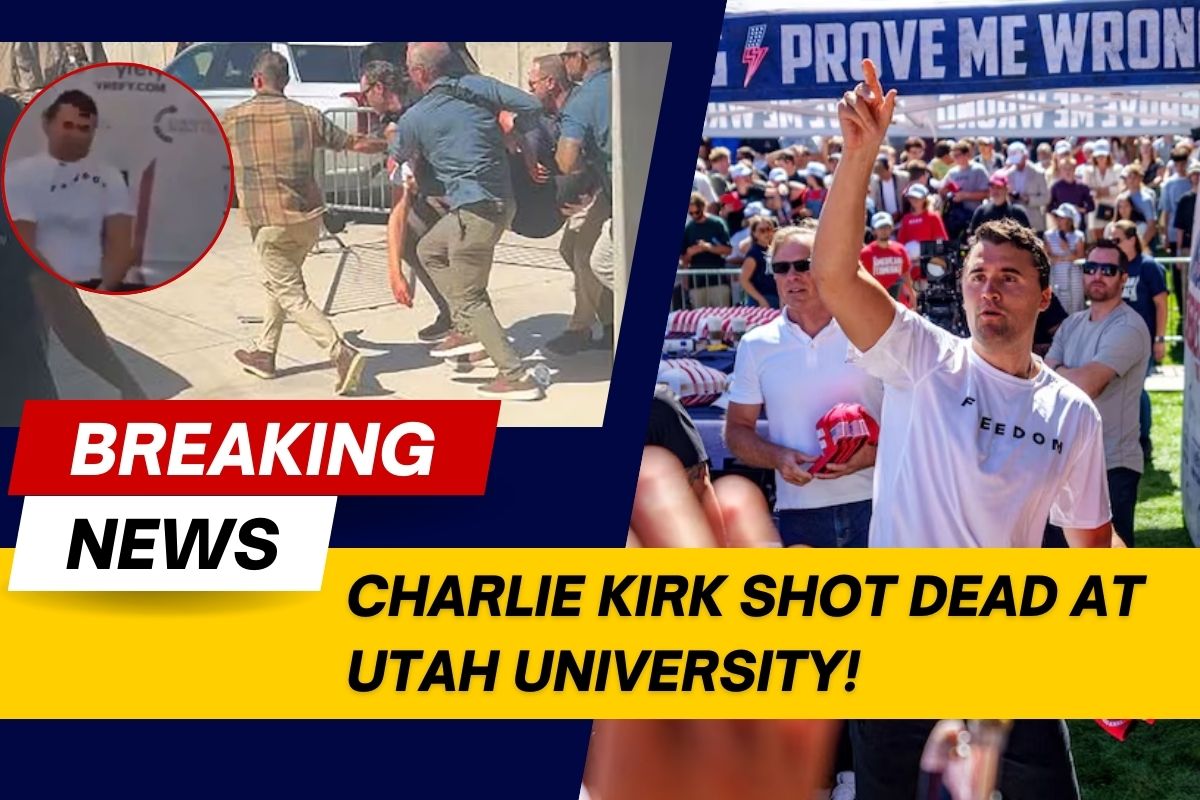Charlie Kirk, 31, the co-founder of Turning Point USA, was shot and killed while speaking at Utah Valley University on September 10, 2025. He collapsed after a single round struck his neck beneath a tented stage. His death sent shockwaves through American politics.
He had drawn roughly 1,000 people for a Q&A session on his “American Comeback Tour.” The audience scattered in panic when the shot rang out just 20 minutes into his talk. Campus operations were suspended for days as investigators searched for the shooter.
Investigators believe the bullet came from a building about 200 yards from the stage. Authorities initially detained a person of interest but released them after questioning. The case remains open, with no suspect publicly charged. The FBI and local agencies continue to gather evidence.
President Donald Trump called his death “an atrocity” and ordered flags at half-staff. Leaders across the spectrum condemned the act and urged calm. Yet debate flared over the role of political rhetoric in elevating tensions across the country.
Incident Details
| Detail | Information |
|---|---|
| Date | September 10, 2025 |
| Time | 12:10 p.m. local |
| Location | Utah Valley University, Orem, UT |
| Victim Age | 31 |
| Attendance | ~1,000 |
| Shooter Position | 200 yards away in Losee Center |
| Suspect Status | Released after questioning |
A Pattern of Public Violence
Political assassinations are rare but devastating. In U.S. history, only a handful of national figures have been killed for their positions. Each tragedy forces a reckoning over security, speech, and the fragility of civic life.
Campus events have seen a worrying uptick in violence. Between 2015 and 2024, the number of fatal campus shootings rose by 27%. While not all incidents are politically motivated, they underscore the vulnerability of public gatherings.
Also Read: Sava Stock
Reactions and Ramifications
Within hours, social media lit up with grief. Conservative and liberal voices alike urged unity. Hollywood figures—from Arnold Schwarzenegger to Jimmy Kimmel—paused partisan jabs to call for empathy and action.
House Speaker Mike Johnson called Kirk a “close confidant,” while Vice President JD Vance asked Americans to “say a prayer.” Debates then shifted: should we tighten campus security or focus on mental health? Both sides agreed the status quo is untenable.
Historical Perspective
Looking back, U.S. political killings shaped national policy:
| Figure | Year | Impact |
|---|---|---|
| Abraham Lincoln | 1865 | Accelerated Reconstruction debates |
| James A. Garfield | 1881 | Spurred civil service reform |
| William McKinley | 1901 | Prompted Secret Service protection |
| Martin Luther King Jr. | 1968 | Catalyzed civil rights legislation |
Each loss altered security protocols and political discourse. Kirk’s death may similarly trigger new measures for event safety.
Options Moving Forward
-
Increase law enforcement presence at high-profile speeches.
-
Install metal detectors and clear-bag policies.
-
Expand threat-assessment teams on campuses.
-
Bolster mental-health resources for students and staff.
Combining these steps can lower risks while preserving open dialogue.
What Comes Next
Investigators are analyzing video, shell casings, and cell-phone data. Campus officials plan to review emergency-response drills. Turning Point USA said it will continue the Comeback Tour with enhanced security.
Grieving supporters have set up vigils in Orem and online memorials nationwide. Polls often show public confidence dips after such violence. This moment could either deepen divisions or inspire a shared vow: to protect free speech without fear.
Violence against public figures is a stark reminder that words carry weight. As America mourns Charlie Kirk, it faces a choice: let anger fester or forge a safer path for political exchange. The next chapters will test whether we can honor his legacy by uniting against violence and safeguarding open debate.


